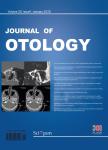THE EFFECTS OF SALICYLATE ON AUDITORY EVOKED POTENTIAL AMPLITWDE FROM THE AUDITORY CORTEX AND AUDITORY BRAINSTEM
THE EFFECTS OF SALICYLATE ON AUDITORY EVOKED POTENTIAL AMPLITWDE FROM THE AUDITORY CORTEX AND AUDITORY BRAINSTEM作者机构:Center for Hearing & Deafness Department of Communicative Disorders and Sciences State University of New York at Buffalo
出 版 物:《Journal of Otology》 (中华耳科学杂志(英文版))
年 卷 期:2014年第9卷第1期
页 面:30-35页
学科分类:1002[医学-临床医学] 100213[医学-耳鼻咽喉科学] 10[医学]
主 题:Salicylate Tinnitus Auditory brainstem response
摘 要:Tinnitus has often been studied using salicylate in animal models as they are capable of inducing tempo-rary hearing loss and tinnitus. Studies have recently observed enhancement of auditory evoked responses of the auditory cortex (AC) post salicylate treatment which is also shown to be related to tinnitus like behavior in rats. The aim of this study was to observe if enhancements of the AC post salicylate treatment are also present at structures in the brainstem. Four male Sprague Dawley rats with AC implanted electrodes were tested for both AC and auditory brainstem response (ABR) recordings pre and post 250 mg/kg intraperitone-al injections of salicylate. The responses were recorded as the peak to trough amplitudes of P1-N1 (AC), ABR wave V, and ABR waveⅡ. AC responses resulted in statistically significant enhancement of ampli-tude at 2 hours post salicylate with 90 dB stimuli tone bursts of 4, 8, 12, and 20 kHz. Wave V of ABR re-sponses at 90 dB resulted in a statistically significant reduction of amplitude 2 hours post salicylate and a mean decrease of amplitude of 31%for 16 kHz. WaveⅡamplitudes at 2 hours post treatment were signifi-cantly reduced for 4, 12, and 20 kHz stimuli at 90 dB SPL. Our results suggest that the enhancement chang-es of the AC related to salicylate induced tinnitus are generated superior to the level of the inferior colliculus and may originate in the AC.




